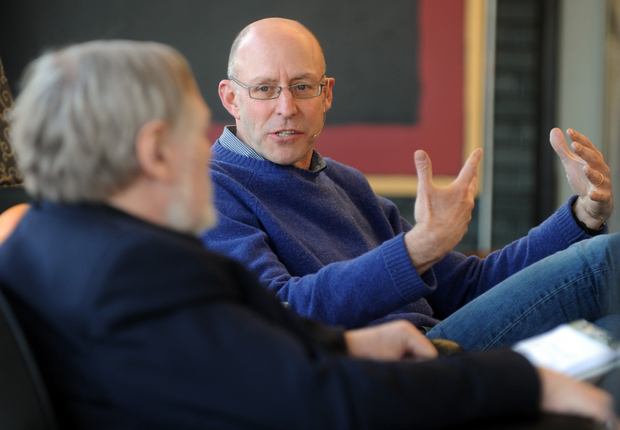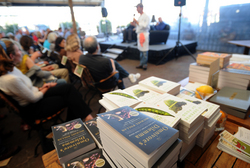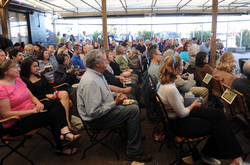Michael Pollan discusses the politics of food during fundraiser for Edible Avalon, HomeGrown Festival & Summit

Michael Pollan speaks to Chris Bedford at the fundraiser for Edible Avalon and the HomeGrown Festival & Summit
Melanie Maxwell | AnnArbor.com
As in meat has “gradually become a deracinated product. First there were butchers and you could actually see carcasses being cut up occasionally, and then [the meat was] always prepackaged, and then the bones disappeared. We are looking to take this protein and return it to, or advance it to, a state of pure protoplasm.” A protoplasm that is completely uprooted from the sinew, tendons and ligaments of the animal that once breathed and lived on this earth.
The urge to mediate this sense of displacement was a theme that ran throughout the hour-long conversation at the fundraiser for Edible Avalon and the HomeGrown Festival & Summit that took place at the Zingerman’s Roadhouse on Sunday evening.
As Pollan said to the event organizer Chris Bedford, “one of the things you learn very quickly is that food is a stand in for a whole lot of other issues. As much as we care about food and health and the environment — finally it is about community. Community is the deeper hunger that people feel and food has been a way to create community.”
His words echoed what Kim Bayer, of the HomeGrown Summit & Festival, said to me at the beginning of the evening. “This is an example of community working together to create a better community," Bayer said. "A lot of people donated their time so the impact could be the biggest it could be. I consider this a local food victory to add to our list for 2010.”
The evening started (for a generous few) with an intimate conversation with Pollan. Soon more than 100 of us found seats, munching on the locally-grown appetizers provided by Zingerman’s Cornman Farms, to participate in the conversation.
The discussion began with Bayer and Kris Kaul of Edible Avalon describing their organizations and thanking Pollan, Bedford and Zingerman's Roadhouse.
Bedford, a 25-year veteran filmmaker and food advocate, started by asking Pollan four questions. His first question was about the state of the food.

Participants had the opportunity to purchase Pollan's books to be signed by the author.
Melanie Maxwell | AnnArbor.com
Pollan speaks with the assurance of a college professor and someone who is comfortable in front of crowds.
“I think there is a food movement, and I think that it is one of the most interesting social movements happening right now… I think there is this growing recognition that the system we have is not serving people well, is not serving our health, the environment, is not serving the workers, is not serving the animals," Pollan said. "I think there is something really fundamental about food; you have choice there that you don’t have in many other areas. You don’t have to wait for the whole political system to move. You can do something today. You can do something three times tomorrow … that will have an effect.”
Bedford mentioned the reductionist paradigm of nutritionsim that Pollan discussed extensively in Defense of Food. (For those of you who may not be familiar — the premise I took away from the book was that food is a delivery system for nutrients, nutrients are the only important things and, since I cannot sense them, I need experts to tell me what they are. Therefore the experts divide food into good and bad nutrition parts, and the whole point of eating becomes to promote health as opposed to create pleasure or community.)
Pollan dove right in with the history. “Back 150 years you can find people talking about the need to make our eating more scientific," he said. "If we can get the science we won’t have to trouble ourselves with all of these uncertain areas having to do with pleasure. So we have been eating in a reductive way for a long time.”
“We’ve always had some issues with food in this country — I mean, the whole culture is descended from Puritans who have a lot of trouble taking pleasure in things that animals also do," Pollan said. "Food is one of those things, and you know what some of the others are.”
Bedford asked Pollan about the divide between those who believe that animals are part of our food system and those who believe animals should not be.
Pollan said he feels "it is healthy we are talking about these issues. All I ask of my readers is that they think through the consequences of their food choices, wherever they come out."
In a sharp turn away from discussing Joel Salatin’s Polyface Farms in Virginia and its effects on vegetarians deciding they could support eating his meat, Bedford asked about government receptivity to the food movement.
Pollan addressed the farm bill. “To the extent that food politics becomes national politics, it is very hard to justify the subsidy system that we have today," he said. "If you listen to someone like Collin Peterson, the head of the House Ag committee, when he is giving interviews, its like 'Who are these people to raise any questions about agriculture?'”
Then for the first time during the evening, Pollan raised his voice. “Well, these people are eaters! These are the eaters of American agriculture, and they have a dog in this fight," he said. Pollan argued we need to show our elected officials that their vote on the farm bill is not one they can trade easily or think we will ignore.Questions asked during the audience question-and-answer session included:
Q: What kind of things can we do here in Ann Arbor?
Pollan discussed the tax on high fructose corn syrup that has been put forward in several states, “though it is a little weird to me that you are taxing something that you make cheap with other policies — subsidizing and then taxing the same thing.”
Q: I worry that conventional farmers will be left behind in this movement. They have invested their whole lives into farming, what are your thoughts?
Pollan shared that he often speaks at agriculture schools where many in the audience have not read his books. “My general sense is that it is possible to show the organizations that are ostensibly representing them are not representing their interests. That they stand to benefit from a more decentralized and farmer-centered food system.”

Over 100 people attended the event.
Melanie Maxwell | AnnArbor.com
“As soon as you start talking to them about monopoly, they really understand that. That is fundamentally the common ground. Monopoly threatens us as eaters. But monopoly threatens them too because they are price takers, and they have lost complete control of their market place.”
“Their challenge is getting from there to here. Once you have invested in that confinement hog shed — it is a very capital-intensive type of agriculture. They have spent a lot of money, and it is very hard for them to get out of it. We need to create structures to allow farmers to move. Right now we have the opposite — they are so locked in and those are the things we have to work for.”
Q: How can we bring food to the deserts, like Detroit? Pollan discussed some of the policies that are working, like the Wholesome Wave Foundation in Connecticut, which has a program for those receiving food stamps to spend vouchers at farmers markets all over the country. However, he quickly stated, “This is when I am out of my depth because I am a writer, not a policy maker — we need people in this movement who are very creative — so we can figure out how to do this.”
Q: What about the microwave? Pollan leaned back in his chair, “The microwave is a big problem. It has changed eating in America. It helped to destroy the family dinner — it became possible for the food makers to make a different meal for each member of the family, but since it can only heat up one at a time — it lead to serial eating, not shared eating.”
Q: American Bourbon was made a heritage product in 1964 by Congress. Do you think that legislating more American food items as heritage products is a good or a bad thing? "The Europeans have done this the most, and it has a very interesting effect."
“First of all, it defends the food against adulteration. Which is a word that we don’t use nearly enough … And it also creates an awareness of that there is a tradition here. A cultural tradition that is worth preserving.”
“It is controversial — because there are people in Wisconsin making Parmesan cheese. Of course the people in Italy think that should not be allowed. So I don’t know where I stand on that issue. It is worth working on.”
Q: I try to choose healthy food for my family, and I am frustrated in the grocery store because I don’t know when something is genetically modified. Do you have any idea if there is legislation to bring that forward to protect my family? “There is a bill introduced in every Congress sponsored by Dennis Kucinich and it gets maybe 12-15 or 20 cosponsors and that is it — which is fascinating because when you poll the American public, about 90 percent of the people want GMO to be labeled — it is a very popular issue. So why don’t the politicians reflect this public interest?”
“When both parties agree on something there is no room for debate and GMOs are one of those issues. Both political parties support it strongly. This might have to be one of those local issues.”
Q: What about urban farming in a place like Detroit? Pollan mentioned Will Allen’s Growing Power in Milwaukee as a stellar example. “Urban agriculture has a potential to help in the inner city on several levels. It is community building, it provides jobs, and it provides healthy food.”
Q: Where do you think the tipping point is of our very vulnerable commercial food system? “You know, I don’t know where it comes. When we say that a system is unsustainable, we mean something very specific, which is that it is depending on conditions that it can’t depend on, or it's destroying what it needs to keep going. And I think that is a fair description of the industrial food system. But where the breakdown is going to come is very hard to say. It might be oil prices. It might be water. I don’t think we know.”
“I think the key is to build up the alternatives to it with our consumer dollars and our policy changes so that when the breakdown comes we will still be able to eat.”
“The challenge is going to be to let a thousand flowers bloom and see what works. And not to put all of our, changing metaphors, sorry, eggs into one basket.”
And with that humor tempering the doomsday potential of Pollan's earlier statement, the audience cheered and formed a line to have books signed.
Personally, unlike the benighted deracinated protein protoplasm, I felt deeply rooted in the shared knowledge and concerns of the collected guests by the end of the evening.
Corinna works with the Westside Farmers Market and writes about many things.


Comments
Jennifer Shikes Haines
Tue, Apr 13, 2010 : 1:25 p.m.
Lovely article Corinna! Also a HUGE thank you to Michael Pollan, Zingerman's Roadhouse and Chris Bedford for giving their time and expertise to raise money for these wonderful causes. Once again, Zingerman's does something lovely for our community. Thank you.